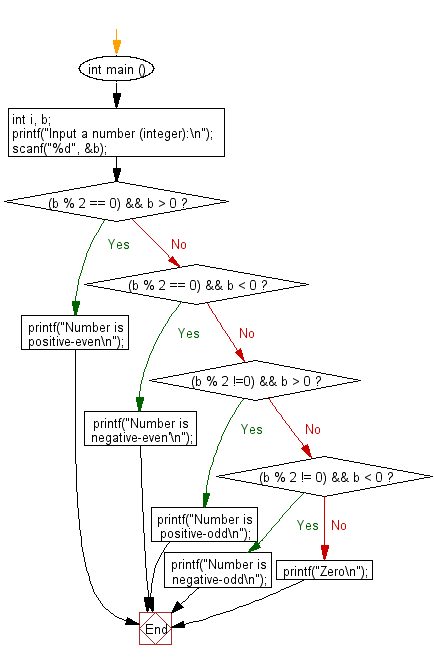C Exercises: Find the odd, even, positive and negative number form a given number and print a message
C Basic Declarations and Expressions: Exercise-110 with Solution
Write a C program to find the odd, even, positive and negative number form a given number(integer) and print a message 'Number is positive odd' or 'Number is negative odd' or 'Number is positive even' or 'Number is negative even'. If the number is 0 print “Zero”.
Sample Solution:
C Code:
#include <stdio.h>
int main () {
int i, b;
printf("Input a number (integer):\n");
scanf("%d", &b);
if ((b % 2 == 0) && b > 0){
printf("Number is positive-even\n");
}
else{
if ((b % 2 == 0) && b < 0){
printf("Number is negative-even'\n");
}
else{
if ((b % 2 !=0) && b > 0){
printf("Number is positive-odd\n");
}
else{
if ((b % 2 != 0) && b < 0){
printf("Number is negative-odd\n");
}
else{
printf("Zero\n");
}
}
}
}
}
Sample Output:
Input a number (integer): 12 Number is positive-even
Flowchart:

C programming Code Editor:
Contribute your code and comments through Disqus.
Previous: Write a C program to find and print the square of each even and odd values between 1 and a given number (4 < n < 101).
Next: Write a C program that accepts an integer from the user and divide all numbers between 1 and 100. Print those numbers where remainder value is 3.
What is the difficulty level of this exercise?
Test your Programming skills with w3resource's quiz.
C Programming: Tips of the Day
Static variable inside of a function in C
The scope of variable is where the variable name can be seen. Here, x is visible only inside function foo().
The lifetime of a variable is the period over which it exists. If x were defined without the keyword static, the lifetime would be from the entry into foo() to the return from foo(); so it would be re-initialized to 5 on every call.
The keyword static acts to extend the lifetime of a variable to the lifetime of the programme; e.g. initialization occurs once and once only and then the variable retains its value - whatever it has come to be - over all future calls to foo().
Ref : https://bit.ly/3fOq7XP
- New Content published on w3resource:
- HTML-CSS Practical: Exercises, Practice, Solution
- Java Regular Expression: Exercises, Practice, Solution
- Scala Programming Exercises, Practice, Solution
- Python Itertools exercises
- Python Numpy exercises
- Python GeoPy Package exercises
- Python Pandas exercises
- Python nltk exercises
- Python BeautifulSoup exercises
- Form Template
- Composer - PHP Package Manager
- PHPUnit - PHP Testing
- Laravel - PHP Framework
- Angular - JavaScript Framework
- Vue - JavaScript Framework
- Jest - JavaScript Testing Framework
